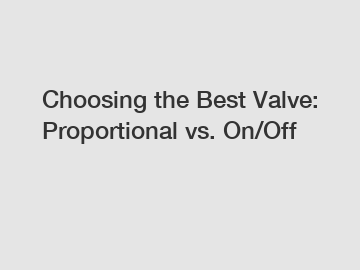Choosing the Best Valve: Proportional vs. On/Off
When it comes to selecting a valve for your industrial applications, the decision can have a significant impact on process control, efficiency, and overall performance. With different types available, understanding the differences between a proportional valve and an on/off valve is crucial. In this blog, we will delve into the characteristics, advantages, and best applications of both valve types. So, let's explore the world of valves and help you make an informed decision!
Proportional Valve: Precise Control to Optimize Efficiency.
Proportional valves are designed to provide accurate control by adjusting the flow rate or pressure in proportion to an external input signal. These valves operate with varying degrees of valve opening, allowing for precise control over the fluid passing through. A proportional valve offers several advantages over its on/off counterpart, making it an ideal choice for industries that prioritize accuracy and efficiency.

1. Enhanced Process Control: By providing smooth modulation of flow or pressure, proportional valves excel in applications that demand precise control, such as in chemical dosing, HVAC systems, and hydraulic machinery. Their ability to maintain continuous control over fluid parameters ensures optimal process performance.
2. Improved Efficiency: The proportional valve's ability to adapt the flow or pressure in response to changing process requirements enables efficient energy consumption. By avoiding sudden start-stop operations, proportional valves reduce energy wastage, extend equipment lifespan, and reduce maintenance costs.
3. Flexibility: Proportional valves can be easily integrated into complex control systems, enabling real-time adjustments and automation. By accepting a range of input signals, these valves can be customized to cater to specific application needs, allowing for versatility in operations.
On/Off Valve: Simplicity and Reliability.
On/off valves, as the name suggests, operate in an all-or-nothing manner, providing full flow or complete closure. While they may lack the precision modulation of their proportional counterparts, on/off valves showcase their unique advantages, making them the preferred choice for certain industrial settings.
1. Simplicity: On/off valves are straightforward to operate and install, making them a popular choice in applications where complex control systems are unnecessary. Their simplicity ensures ease of maintenance and reduces risks of operational complications.
2. Cost-Effective: On/off valves are typically more affordable than proportional valves, making them an attractive option for budget-conscious projects. Their reliable functionality, combined with a lower upfront investment, makes on/off valves suitable for applications that do not require precise control.
3. Safety Measures: In scenarios necessitating quick emergency shutdowns, on/off valves are the go-to option. By instantly cutting off fluid flow in an emergency event, these valves help prevent accidents and protect personnel, machinery, and the environment.
Choosing the Right Valve for Your Application.
Selecting the perfect valve type depends on the specific requirements of your application. Here are some factors to consider when making a choice:
1. Process Precision: If precise control and modulation are necessary, a proportional valve will be the ideal choice. Applications involving flow or pressure control, such as in chemical production or hydraulic systems, benefit greatly from proportional valves.
2. Budget Constraints: If cost is a major concern and less precise control is acceptable, on/off valves provide a cost-effective solution without compromising reliability. They are often found in applications like water treatment plants or sprinkler systems.
3. Safety Considerations: In situations where rapid and complete flow control is critical, an on/off valve provides the necessary safety measures, making it suitable for emergency applications or shutting down volatile fluid processes.
Conclusion.
Valves play a crucial role in process control, ensuring optimal performance and efficiency in industrial applications. By weighing the advantages and assessing the unique requirements of your project, you can make an informed decision between a proportional valve and an on/off valve. Whether it's precision, simplicity, cost-effectiveness, or safety that you prioritize, selecting the best valve will positively impact your operations. So, choose wisely, and let the correct valve type pave the way for success in your industry!
The company is the world’s best Metro Hydraulic Valve, Stacked hydraulic control check valve, Multistage Electro-Hydraulic Pilot Relief Valve supplier. We are your one-stop shop for all needs. Our staff are highly-specialized and will help you find the product you need.
166
0
0


Comments
All Comments (0)